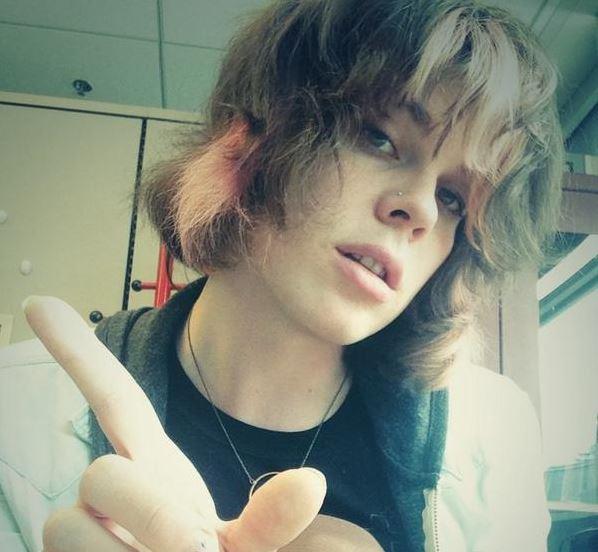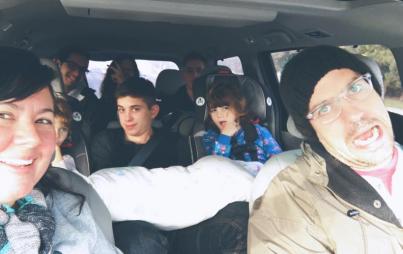
Lavish your adoration onto my friends, the rad lady and gender non-conforming folk who make up the resistance against #Gamergate. Checkout my other interviews, with Leigh Alexander, Soha Kareem and Toni Rocca, by clicking on the little purple words.
Aevee Bee gave me my start in games journalism. I had quit my tech sector job. I didn't know what I would do with my life, but I knew it couldn't be that, not anymore. Aevee agreed to fund a trip to Musee Meccanique, San Francisco's antique arcade, for a photo essay on the decline of public amusement in America. I had no real experience—just a lot of love.
She took a chance on me. If only it paid out for her: I was hospitalized before I could finish the article. But her implicit faith in me encouraged me to pursue the life of a feminazi farmhand, milking the tears of cisgender heterosexual men to sustain the shadowy cabal of social justice critique.
Our community is visible, but small. We are denied, at times, the motherhood and sisterness that fosters a shared identity of woman. Because of birth assignment. Because we like other girls. Because we don't like anyone.
We must serve as sisters and mentors to one another. Sometimes both at the same time.
Aevee's monthly micro-zine, ZEAL, has nurtured the voice of many aspiring ne'er do wells. When everyday is a besiegement on your identity and right to exist, paying someone to make their art and giving them a platform to be seen and heard is nothing less than "saving lives."
While cisgender men are utilizing crowdfunding to make potato salad and stalk feminist media critics, Aevee Bee channels her charm and visibility into creating viable, sustainable paid work for people who might otherwise not be able to pay for groceries or make rent.
That is feminist as fuck.
Aevee is a cultivator of care for her community—though I am older and "more experienced" at being a trans woman, I look up to Aevee.
She is, in ways immaterial, my mentor.
This tableau—one trans woman games writer speaking to another—is not so strange or rare of an occurrence. Does the narrative of "exploring your gender through games" resonate for you, personally? Or maybe pursue is a better word.
We look for it in whatever we have, even if all we have is junk, and sometimes that is the only place we're allowed to find it in. After being shamed and bullied out of the direct routes, games and the Internet are some of the few safe secret places for trans folx of our generation.
I worry that we overemphasize those shared experiences in a way that kicks people who don't share them out, but it's also such a relief to talk with someone who experienced pop culture in the same ways you did. Like oh god, someone else felt the same things I did when I played that, you identified with her too, that one made you self-conscious and ashamed? So I don't think it's necessarily any particular function of games; it just happens to be what we have and what we share.
Still, games in particular do ask for your input in ways that eventually start getting hard to deny. Feelings can be pushed down and blanked out, but when you make the choice to be a girl literally every time it's offered to you, the evidence sure does start adding up, doesn't it? I remember my dad watching over my shoulder while I played Final Fantasy VI and commenting, not judgmentally or anything, that I had given Terra Branford the feminine form of my given name and like, wow, how obvious can you get? It's almost embarrassing, haha.
I suppose that is harder to hide, harder to intellectualize away than my experiences with literature, and since I was mostly reading dude narratives about dudes I was also pretty safe from encountering anything articulate or interesting about gender, and when I did, I knew enough critical theory to drain the blood right out of it. I think a lot of closeted trans women seek out the cold embrace of academia to allow them to process identity theoretically without ever being forced to think about it as reality, but that could just be me and more than a few of my friends. 
But you can't lie about the stuff you feel emotional about, even if that stuff is stupid. There's that passage in the book Nevada where Maria is talking about how she couldn't lie to herself about her feelings about her body when it came to the porn she read, and I think that's true of anything you're invested in emotionally, even if you have zero intellectual faith in it. I remember so clearly the feeling of utter disinterest and resignation at picking boys when playing with friends because I understood picking girls every single time I had a choice was triggering their faggot-sense and I was making it too obvious. I am a pretty late transitioning woman for a number of reasons, but it was from a pretty early age that I found being trans unignorable, and selecting the girl in the video game was one of the only ways I had to express it.
There is a lot "wrong" with the games industry, and you can burn out on rage and frustration before you ever find your voice. Has your work with ZEAL, in your focus on older games, helped you maintain that spark, that non-obligated enthusiasm for games?
I would probably be pretty done with games if not for ZEAL! There's not a lot of places to talk about commercial failures from 2000 to 2010, not a lot of places for people who aren't journos or academic writers to pitch interesting stuff, and there's not a lot of crit that focuses on craft and form rather than literary and film criticism that is also interested in expression, creation, and narrative rather than "fun" and loops.
The 7/10 games from the last decade (they're kind of the B movies of games, so maybe BBB is another way to describe them?) absolutely fascinate me. They are trying so many weird ideas on limited but still major budgets and succeeding in incredible ways that are mostly forgotten! Maybe 2000-2010 Japanese commercial failures are the camp of late transitioning twenty-something women in 2014, but it's likely just me.
It's still obligated work, of course, since I put it out every month, and I have to coordinate other writers and artists, but the pacing is much friendlier. I have time to actually play the games and I get to write about the most interesting part of them and ignore everything else, and I don't have to give a totalizing and meaningless score at the end! There's no pressure in this kind of archeology and there's so much to learn. I think I will certainly be doing this for another year.
How has your work as an educator and academic informed your relationship with the games community? Do you see yourself as a curator or archivist of alternative critique? Do you like apples? Should we bring you some apples?
I am so down to be bribed with fruit! Actually, I'm a bit surprised at how important teaching and mentoring has become to me. I've been wrestling with this a lot recently, especially in the wake of g*merg*te, but as hurt and compelled as I feel to correct wrongs and be outspoken I want the work that I do to be for the people in my community, especially young people, to understand and critically think about the world and to help them make important and beautiful art that will examine it.
This feels like the lasting change we badly need, and honestly there are so so many amazing young talented artistic people in marginalized groups that need support and encouragement so badly because they get it from almost nowhere, even if they're 10 times more clever and talented than their peers.
I of course do my fair share of educating the privileged, too (and like, I am a pretty privileged person myself in a whole lot of ways), in my classes and advising, but the relationship there is so different—I can have actual discourse with people willing and able to honestly engage. The teacher/student framing is really important for this kind of conversation to happen that's actually education, not debate, which isn't possible if you don't even know what you're talking about. I think I'd rather engage deeply with the willing than fight tooth and nail for the slightest concession from the deliberately disingenuous.
"Removed," an essay I wrote recently for ZEAL, was kind of a weird experiment but it's expressing a lot of feelings about motherhood and I guess I feel like I can be a mother through teaching—I guess that's mostly how I think of my own mother, who teaches at a women's college, and she taught me so much of that. I want to pay it forward. My work is not directly "queer," though I specifically look for contributors who can bring that perspective. But I do hope that by peeling opening these games and showing how they work, the mechanical and formal elements present, I can create a vocabulary that queer creators (or at least myself!) can use to design games that are queer.
I think about Merritt Kopas and Naomi Clark''s talk at QGCon, and how far we are from discussions about what a queer game mechanic is, and part of that is because we don't write or talk about the mechanics so directly, except for feedback loops because we want to complain about/celebrate their manipulative monetization success.
For example, Atelier Escha, a strikingly desexualized game about working for a community and building relationships and creating a space of happiness for yourself and your friends is kind of . . . incredibly radical in a lot of ways, and it's just a JRPG with some very clever and important design decisions.
[Author's note: JRPG means "Japanese role playing game."]
It wouldn't be difficult to push this over the edge into something truly queer, and I see Lulu Blue's Fantastic Witch Collective, aiming for a queer take on well worn JRPG mechanics and see how some of those theories might be put into practice. I think these fundamentals of craft and form, as attached as they are to the sorts of games we feel strongly about moving away from, are incredibly effective and useful and have a lot to offer us.

[Author's note: credit for the above image goes to Codabreak.]
Narrative and choices are all well and good, but we often overlook, when talking about games, the gratification of holding a thing with shapes on it that affects on-screen stimuli when we manipulate it. Do you have a favorite console controller—just in terms of design and sentimental value? I guess they're called gamepads now.
They're called gamepads? When did this happen!
Let's seeeeeeee, surely the Dualshock is the controller I have held the most, the Genesis is the most nostalgic, but I recently played with a very very nice fightstick owned by TJ Thomas and it was so responsive and lively and it let me do everything I wanted, which is for fighting games a pretty amazing feeling, and now I want one more than anything.
Nothing is more frustrating than the game not doing what you tell it to, and the more it seems like the game is just transmitting your thoughts on the screen the more it feels like the body there is yours, and that is a wonderful and dreamlike feeling to have.
Your breakdown of fighting game strategy is some of the best games writing I've seen. It helped re-contextualize something I love, in a positive way, by showing me how it works. I fear that this shared waking nightmare will "spoil" those games for me before I have a chance to apply what I've learned from your piece. How do you maintain your love of games in the wake of harassment, and do games figure into your self-care?
I definitely wind down with a lot of games. Muramasa soothes me because it's very repetitive and plays seamlessly and is intensely action-y in these beautiful Japanese landscapes. I also like fighting games, though actual matches and practice kind of wind me up. Recently I've been reading comics and zines, and those have really been a good way to get a break from a screen and the online deluge. I need to be able to disconnect completely sometimes, and though I often do this through games, I feel that print is a place I need to go more.
However, when it comes to just enjoying games, I have a lot of support. Fighting games for instance; I have a lot of friends who love fighting games and my enthusiasm for them has only grown. There's certainly a lot of bad parts to the fighting game community, but there are some amazing folx there too. Patrick Miller is a fantastic writer and friend and his work helped model the sort of writing you see in that article. TJ Thomas, who runs Alpha 6 in Seattle, is the person who let me play on the very very nice fightstick, and he's a developer I'm super excited about who's also a great friend.
I spent the GaymerX convention last year in a pile of gay girls in a San Fransisco hotel room watching EVO (with some cool boys, too, I am sorry I won't forget you) and like, I could go on for a long time talking about people I like who I enjoy watching fighting games with. People are my best self care, and there's nothing anyone can do to take away how much fun I've had with my friends and we're only getting stronger!
What does "home" mean to you? Is it where you're from, is it where your community is? What is home and what reminds you of home?
Home is a lot of things—I associate it with familiar things. I might not be so good at carving home for myself, though recently I have tried and I'm happy, in a lot of ways actually, with the results. My community is everywhere but home, so sometimes home seems lonely, but I have wonderful friends here and I love Olympia [Washington]. It's my perfect weather and the culture is great and I could live and work here for a long time. A quiet niche for myself is not such a bad thing.
Are there any games out there right now that fit your "Cutie Aesthetic" ? When you say "tyranny of reality" I immediately think of the mainstream game industry's desperate reliance on murder simulators—you may have been more literal in your meaning.
No that's pretty much exactly what I wanted to convey! I'm really happy about the cuteness article and it helped a lot of people! I haven't really been focused on cuteness so much recently, but I have been playing a lot of Super Mario 3D World and it's really adorable and sweet and fun and loves you.
I've also been playing Love Live, which is a phone rhythm game that uses a really intense microtransaction model, but it's about all these cute girls having really intense and intimate relationships and there are no men anywhere, and it's just completely about good feelings and friendship. It's saccharine and all that but you can make these silly mobile games about literally anything and I'm so happy there's one where it's just about how cute girls are friends.
How does cuteness fit into your gender identity and expression? It helps me, sometimes, to hold my "aesthetic," whether it's "Team Mom" or "Professor of Pinball," over my gender expression, to keep myself from falling into this cycle of toxic self-comparison to other women. Do you experience a similar relationship to "cuteness"?
Cuteness was really important to me at a time when I needed above all other things to let go of a calcifying stoicism that was actually killing me. I am kind of exploring other things right now, though. I never am sure exactly where my aesthetic lies—I've been exploring a more casual domme side of myself and that's been pretty fun. I'm really into arrogance right now. I've noticed that people are kind of fascinated by me, and I find that fascination really intoxicating, which makes me feel like a Disney villainess or a character from Guilty Gear. I feel a pull of guilt for that though, like I must be a horrible person for enjoying the feeling of being desired and in control so much.
I love women who are being women wrong, and enjoying the wrong things about their identity and sexuality. It's really comforting, probably because I feel like I'm being a woman all wrong and it's comforting to know the people I like the most feel that way too. I think that while ultimately I want to be this calm and soothing teacherly type I also am tired of quietly and automatically acquiescing to the conscious and unconscious demands of those around me when they aren't reasonable or are taking too much. I want to find a strength like that while still being a patient and reliable mentor and teacher.
I think finding that aesthetic can be really important for creating a womanhood that actually fits, so we don't get into toxic self-comparison to others (which I feel toward a variety of genders to be honest; I think we can kind of excuse body envy when it's for someone whose gender identity we don't share, but I sure do feel it sometimes). I can fixate on an aesthetic for a bit and extract something important from it and then move on to something else, which I hope is a healthy way to grow. I'm probably always gonna be the soft butch flannel hipster, though.
You have one of my favorite names. What did it mean to you, when you chose it? When you would recite it, how did it become real?
 Wow this question is making me cry for some reason, though not in a bad way!
Wow this question is making me cry for some reason, though not in a bad way!
I had actually been thinking about it and playing with it in my head and someone suggested it to me and then it stuck and it's my name now. I still do that obsessive repeating, and it still is a way that I remind myself that all of this did happen and I am real and that is my name.
As I'm drifting to sleep I still get seized with this sudden feeling of wow, I am trans, I actually did that . . . it feels like that should have destroyed the world or something but bonus, I get to be trans and also still alive, which is amazing. I am thankful to the people in my life who have seen me; I couldn't have done anything without the people who have called me by my name.
Why is a 7/10 game better than a 10/10 game? Does placing something on the pedestal of "platonic ideal" prevent us from feeling genuine attachment/connection with it?
The obsession with perfection feels so antithetical to art, to trying to do anything risky or interesting at all. That's not to say these games aren't well crafted though—almost every game I review on ZEAL is meticulously designed. Even if they don't have the budget for AAA quality polish, their design decisions are incredible, clever, wonderful. They move me so much more than a feedback loop that's just utterly refined.
One of the reasons for that particular joke is that I want to kill the notion that these games were made on accident. A lot of what gets them bad reviews are deliberate decisions—Breath of Fire V, for instance, is like a 12-hour game and there are a million reasons that everything good about the game comes from that—the survival horror elements, the great level design, the enemy encounters. Literally everything that's cool and interesting about the game depends on that.
But JRPGS are supposed to be 60 hours, so the game gets a 7/10, because it's good, but it's good in ways it's not supposed to be. The 7/10 becomes hilarious because if you enjoyed the game at all, it was because of the decisions that placed it too far outside of expectations to earn it the review score you'd expect from games of that genre. It's a ridiculous loop, and it's the result of someone who just doesn't understand games outside of a framework of games that already exists and this is the mildest example, because Breath of Fire V is still adhering to so so many tropes of its genre! No wonder this same perspective can't even imagine twine work as "games."
10/10 is a tautology of development—it defines itself, mostly through marketing, until it's so thoroughly the only kind of game you can imagine, it must therefore be the best game you can imagine. That games that deviate from the formula even slightly—the cult classics, the B movies of games—get so robbed in the scoring department is evidence of how lazy scoring is in the first place. No wonder Twine and intensely personal or experimental games get so much questioning of whether or not they're even games.
They're human things. 10/10 games absolutely do not want to be human.
Is the pizza in Olympia any good?
Vic's Pizzeria is so good you WILL cry if you go. I always get half Lovely Rita (red sauce base, mozzarella, sweet potato, sun dried tomato, cashews, feta, with a drizzle of basil pesto) and half Four Cheese Olympia (spinach walnut pesto base, roasted red peppers, kalamata olives, red onions, feta, and fontina, pecorino and mozzarella cheeses).
I also fill up a growler there, usually of Irish Death, which is a really dark and sweet beer that's like 9.5% alcohol. Really, this is my best self care tbh.
Spending time with you was one of the best parts of GaymerX2. In many ways I feel that it's a love of other people in games more than a love of games that keeps me "in games"—and I'm OK with that. I'm really happy to have you in my community. Not really a question—but I think we could all be more forthcoming with these feelings right now.
Thank you, gosh—that is so sweet. I agree though—the whole reason I am still in games is because I love the people who make games. Being surrounded by people making beautiful things has made me so happy, and I just meet more and more folx who are incredibly skilled and there's really no other sorts of people I want to hang out with. I keep meeting people who absolutely stun me with how incredible they are at art/humanity/everything . . . wow I'm getting super emotional haha. I'd definitely start sobbing if I listed everyone who's deeply touched me recently so I won't. But they're the reason I'm still here.






